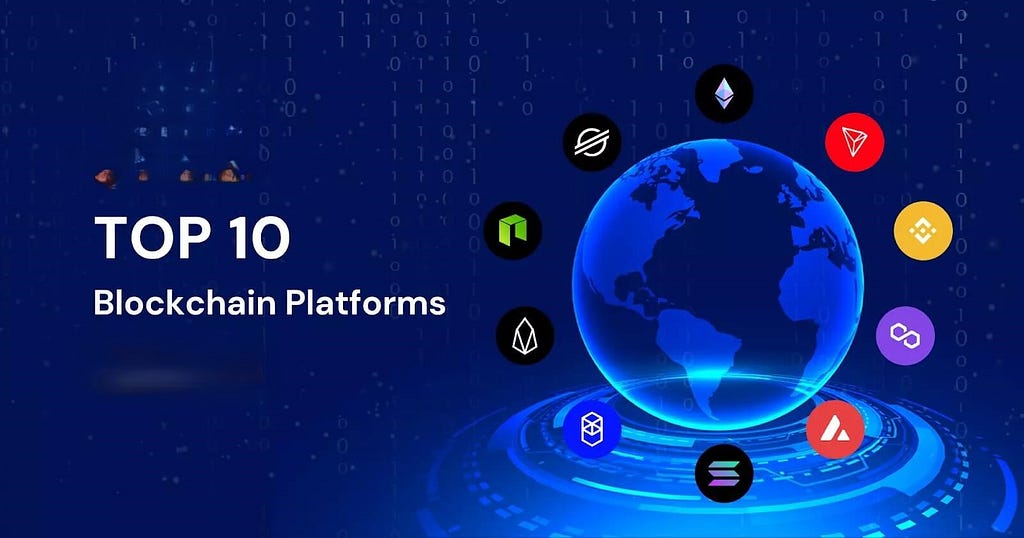
As we move into 2025, blockchain technology continues to gain traction across various industries. Businesses are increasingly recognizing the potential of blockchain to optimize operations, enhance transparency, and create new revenue streams. However, the choice of the right blockchain platform is crucial for developing effective custom blockchain solutions. This blog will delve into the top ten blockchain platforms that are expected to play a significant role in 2025, highlighting their features, advantages, and potential use cases.
1. Ethereum
Ethereum has long been a frontrunner in the blockchain space, primarily due to its ability to support decentralized applications (DApps) and smart contracts. As a public blockchain platform, Ethereum offers a robust framework for developers looking to build complex applications across various sectors.
One of Ethereum’s standout features is its smart contract functionality, which allows developers to create automated agreements that execute when predefined conditions are met. This capability opens up a world of possibilities for industries such as finance, gaming, and supply chain management. The platform also boasts a large and active developer community, which contributes to ongoing improvements and innovations.
Moreover, Ethereum’s interoperability with numerous wallets and exchanges makes it easier for businesses to integrate their applications into the broader blockchain ecosystem. As Ethereum continues to evolve with updates like Ethereum 2.0, which aims to improve scalability and reduce energy consumption, it remains a top choice for organizations seeking reliable blockchain solutions.
2. Hyperledger Fabric
Hyperledger Fabric is an open-source framework designed specifically for enterprise applications. Unlike public blockchains like Ethereum, Hyperledger Fabric offers a permissioned network that enhances privacy and control over data access. This feature is particularly appealing for businesses that require confidentiality in their transactions.
The modular architecture of Hyperledger Fabric allows organizations to customize their blockchain networks according to specific operational needs. Businesses can select components such as consensus mechanisms and membership services that align with their requirements. This flexibility makes Hyperledger Fabric suitable for various use cases, including supply chain tracking, healthcare data management, and financial transactions.
Additionally, Hyperledger Fabric supports high transaction volumes and provides scalability options that can accommodate the growth of enterprise applications. Its focus on enterprise needs positions it as an ideal platform for businesses looking for secure and customizable blockchain solutions.
3. Solana
Solana has emerged as a prominent player in the blockchain arena due to its high throughput and low transaction costs. Designed for speed and efficiency, Solana can process thousands of transactions per second (TPS), making it an attractive option for developers building decentralized applications.
One of Solana’s key advantages is its economical transaction fees, which encourage widespread use among developers and users alike. The platform’s architecture is designed to handle increasing loads without sacrificing performance, making it suitable for projects requiring rapid transaction processing.
Solana’s unique consensus mechanism also contributes to its scalability and speed. As businesses increasingly seek solutions that can handle high volumes of transactions quickly and cost-effectively, Solana stands out as an excellent choice for DeFi platforms, NFT marketplaces, and gaming applications.
4. Avalanche
Avalanche is known for its highly scalable architecture that allows developers to create customized subnets tailored to specific applications. Its unique consensus mechanism ensures fast transaction finality while maintaining security across the network.
The modular design of Avalanche enables developers to build specialized environments for different use cases without compromising performance or security. This flexibility is particularly valuable for businesses looking to deploy custom DApps or engage in asset trading.
Avalanche also supports cross-chain functionality, allowing interaction with other blockchains seamlessly. This interoperability opens up opportunities for businesses to connect with various ecosystems and expand their reach. With its performance capabilities and adaptability, Avalanche is well-positioned as a leading choice for organizations seeking specialized blockchain solutions.
5. Corda
Corda is specifically designed with business use cases in mind, focusing on privacy and security in transactions between organizations. Unlike traditional blockchains that broadcast all transaction details publicly, Corda enables parties to transact directly while maintaining confidentiality through smart contracts.
One of Corda’s key features is its permissioned access model, which ensures that only authorized parties can view transaction details. This emphasis on privacy makes Corda particularly appealing for industries such as finance and insurance where sensitive information must be protected.
Additionally, Corda offers seamless integration capabilities with existing enterprise systems, allowing businesses to adopt blockchain technology without overhauling their current infrastructure. With its focus on privacy and business-oriented features, Corda stands out as a strong option for enterprises looking to implement secure blockchain solutions.
6. Tron
Tron focuses on content sharing and entertainment applications within the blockchain ecosystem. Its mission is to decentralize the web by enabling users to publish, store, and own data freely without intermediaries.
Tron boasts high throughput capabilities similar to Solana, allowing it to process thousands of transactions per second efficiently. The platform also offers low transaction costs, making it accessible for developers creating content distribution platforms or social media networks.
Tron’s user-friendly development tools simplify the process of building decentralized applications (DApps), attracting a diverse range of developers looking to explore blockchain technology in the entertainment sector. With its emphasis on content sharing and community engagement, Tron presents unique opportunities for businesses operating in digital media.
7. Stellar
Stellar is designed primarily for facilitating cross-border payments efficiently by connecting banks, payment systems, and individuals around the globe. Its primary goal is financial inclusivity by enabling users from different regions to transact seamlessly.
One of Stellar’s standout features is its fast transaction processing capabilities — transactions can be completed within seconds at minimal costs. This efficiency makes Stellar particularly suitable for remittances and microtransactions where speed and affordability are essential.
Stellar also incorporates a decentralized exchange feature that allows users to trade assets directly on the network without relying on third-party intermediaries. This functionality enhances liquidity options for businesses engaged in international trade or asset tokenization.
8. EOSIO
EOSIO is known for its scalability and flexibility in building decentralized applications (DApps). It provides developers with a decentralized operating system that allows them to create robust applications without incurring high fees or delays associated with other platforms.
One of EOSIO’s key advantages is its ability to support high transaction volumes while maintaining low latency — ideal characteristics for applications requiring rapid interactions among users. The platform also features a user-friendly development environment equipped with tools that simplify the development process.
EOSIO’s governance model allows stakeholders within the network to influence decisions regarding upgrades or changes — an attractive feature for businesses seeking active participation in their platform’s evolution. With its emphasis on scalability and community governance, EOSIO remains an appealing option for organizations looking to build innovative DApps.
9. NEM (New Economy Movement)
NEM distinguishes itself from other platforms by focusing on ease of use and integration with existing systems while employing a unique consensus algorithm known as Proof-of-Importance (PoI). This algorithm rewards users based on their contributions rather than just their holdings — encouraging active participation within the network.
NEM’s Smart Asset System enables businesses to create customizable assets easily while maintaining control over their digital identities through multisignature accounts that enhance security measures during transactions.
With its namespace system allowing users to create unique identifiers within the network effortlessly — NEM provides innovative solutions suitable for various industries including supply chain management, asset tracking initiatives or digital identity verification efforts.
10. IBM Blockchain
IBM Blockchain offers an enterprise-grade platform built upon Hyperledger Fabric — a framework designed specifically for business applications requiring robust security measures combined with flexibility tailored toward organizational needs.
IBM Blockchain focuses on industries such as finance, supply chain management healthcare manufacturing providing tools necessary for companies seeking secure blockchain networks suited precisely toward their operational requirements while ensuring compliance regulations are met throughout implementation processes involved therein.
The integration support provided by IBM includes training resources aimed at helping organizations effectively adopt blockchain technology into existing infrastructures without disrupting ongoing operations significantly — a crucial consideration during transitional phases involving new technologies being introduced into established workflows across different sectors alike!
Conclusion
Choosing the right blockchain platform is vital for businesses aiming to harness this technology effectively within their operations moving forward into 2025! Each platform discussed — Ethereum, Hyperledger Fabric, Solana, Avalanche, Corda, Tron, Stellar, EOSIO, NEM, IBM Blockchain — offers distinct features suited toward various business needs!
As you explore these options further or consider implementing blockchain technology within your organization partnering experienced blockchain development companies can provide valuable support throughout this process! For expert guidance in building custom solutions tailored specifically toward your business requirements consider reaching out Codezeros — a trusted name offering comprehensive services related directly toward successful implementations involving cutting-edge technologies like those found within today’s rapidly evolving digital landscape!








